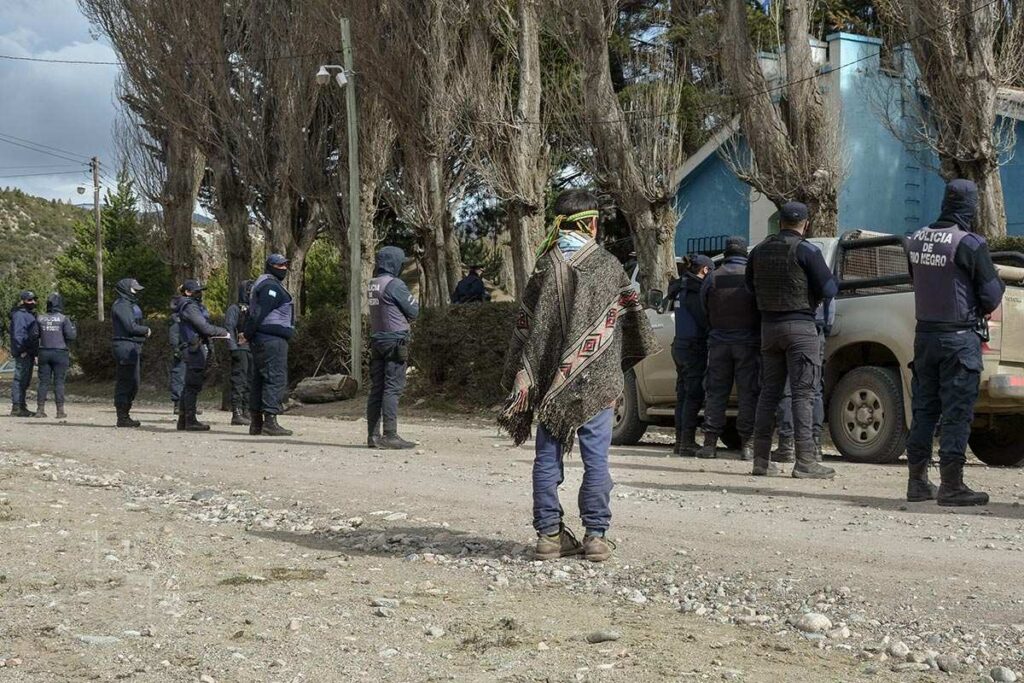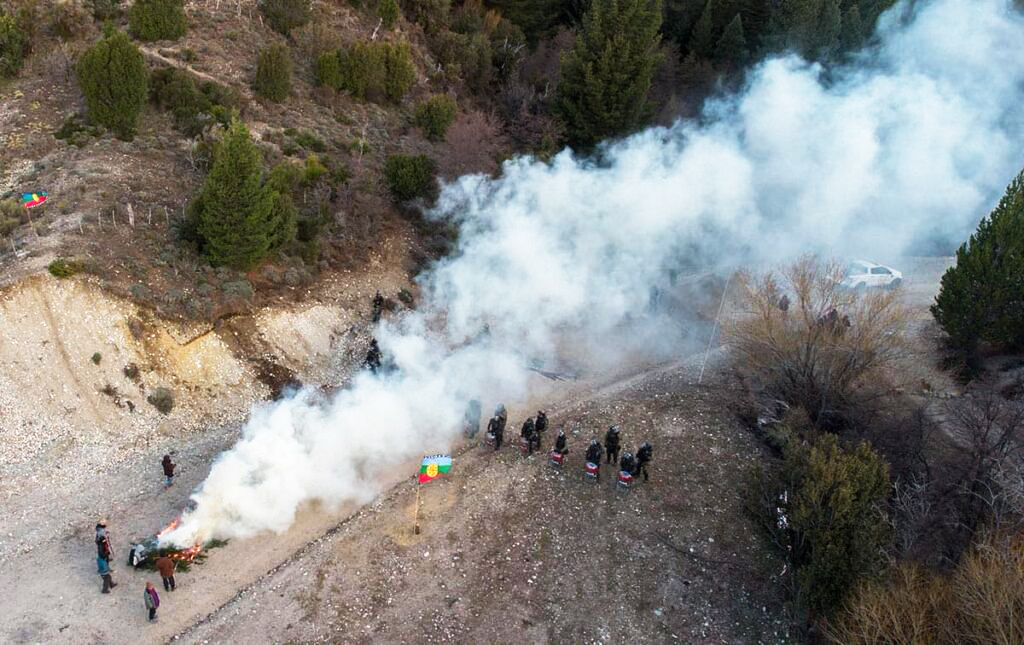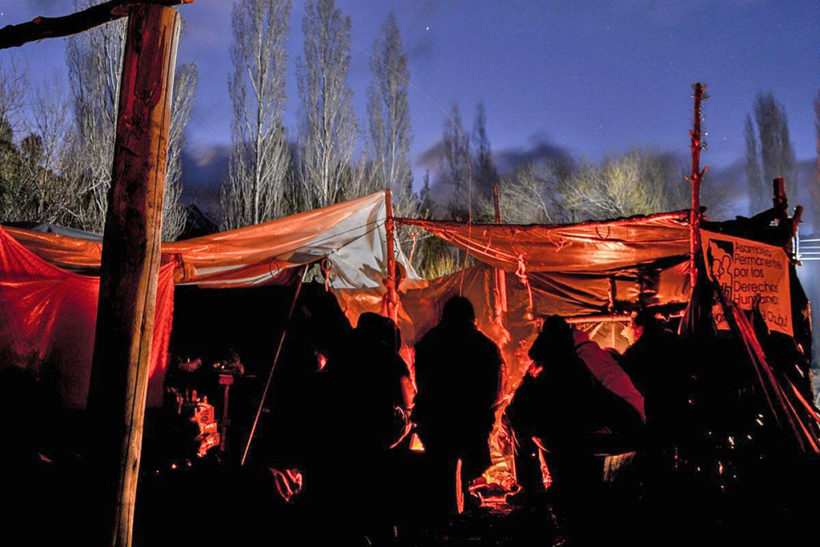One month after the murder of Elías Garay, the Río Negro judiciary ordered the eviction of the Mapuche community in Cuesta del Ternero. The defence lawyer for the lof considered the ruling a “clear act of racism”, but her request to challenge it was denied. The role of the governor of Río Negro, Arabela Carreras, and the trial against the associates of the forestry businessman accused of Garay’s crime.
By Ada Augello (from El Bolsón)
The judge of Río Negro Ricardo Calcagno ordered the eviction of the Mapuche community Quemquemtreu in Cuesta del Ternero, north of the city of El Bolsón. The measure became final after rejecting the challenge presented by the community’s defence lawyer Andrea Reile, but it is on hold due to the judicial fair. The decision to evict the territory means sustaining the dispossession of the Mapuche people, who at the end of November suffered a new death with the crime of the peñi Elías Garay Cayicol, a community member of the lof that for months has been surrounded by the Special Operations and Rescue Corps of the Río Negro Police. “We offer dialogue and they evict us”, lamented Orlando Carriqueo, werken of the Mapuche Tehuelche Parliament.
The challenge filed by Reile opened a negotiation period in the face of the eviction ordered by Calcagno. The contestation hearing, in charge of Judge Gregor Joos, had a first part on Monday 27 December and then a 48-hour intermission until Thursday 30, the last working day before the judicial holiday. The objective was to reach an agreement between the community and the forestry businessman Rolando Rocco, who initiated the eviction lawsuit against the Lof Quemquemtreu for the land that was ceded to him by the provincial state for his private business. Two of Rocco’s partners are charged with the murder of Garay Cayicol.
When the hearing was resumed last Thursday, the Prosecutor’s Office acknowledged “the strong intention of the parties to dialogue” and “the respect” with which the hearings were conducted. However, the dialogue did not succeed. The prosecutor, Betiana Cendón, had already considered the instances of dialogue exhausted in September, when she disobeyed an established agreement to wait for a meeting between Mapuche communities and ordered to enter – by means of bullets – to identify those she considered to be carrying out the usurpation.
Since then, the territory recovered by the lof in Cuesta del Ternero has been cordoned off by the Río Negro police, restricting movement in the area near El Bolsón and isolating a primary school next to the neighbouring village. In turn, Ernesto Saavedra, lawyer for the businessman Rocco, expressed that “dialogue was not possible” and requested that the criminal prosecution be resolved, arguing that the request made by the community exceeded the process opened by the hearing.
What was the request made by the Lof Quemquemtreu’s lawyer? The defence lawyer Andrea Reile argued that there was a lack of actors at the dialogue table and called for the participation of other state bodies to enable a resolution of the conflict. In this sense, Reile also asked for more time before deciding on the eviction. The lof’s request tries to think about the underlying problem and look at it from both an indigenous and a historical perspective. For this reason, INAI and the Mapuche Tehuelche Parliament insisted on the presence of INAI and the Mapuche Tehuelche Parliament at a dialogue table.
In the end, Judge Joos did not grant the request to challenge the eviction order against the community. The year 2022 began for the lof with a firm and timely eviction order.
“The judge removed the Lof Quemquemtreu’s status as a Mapuche community from the sphere of analysis”.
The Lof Quemquemtrew is resisting in the mountains, surrounded by a police cordon that has been harassing anyone who passes through the area for more than three months. The request for the defence to challenge the measure alleged prejudice and manifest arbitrariness on the part of Judge Calcagno by misnaming one of the accused as “Huala” and justifying the confusion by saying that “I have read that surname so much that I have it incorporated”.
In this way, the case for the eviction of the lof in Cuesta del Ternero, in the hands of Calcagno, was linked to Facundo Jones Huala, a Mapuche political prisoner in Chile, tried twice in the same case at the request of extradition by the Chilean state.
“Evidently he (the judge) removed the status of the Lof Quemquemtreu as a Mapuche community from the sphere of analysis. In fact, he said it himself: ‘I’m going to talk about the six accused, the rest…’ So, there is a total disregard for the law, which seems to us not only a reason for manifest arbitrariness but also a reason for recusal and a complaint to the Council of the Judiciary for non-compliance”, says the lawyer defending the Mapuche community, in an interview with Tierra Viva.
“It is very serious that a judge should have such a marked prejudice (…) it was a clear act of pure racism, of xenophobia on the part of a member of the judiciary, it demonstrates an inability to carry out a process of this type”, said Reile.

Quemquemtrew. Photo by Anibal Aguaisol, Luan Colectiva Fotográfica
Monday 27 December was the last window of opportunity to open a path to dialogue. On that day, the hearing to challenge the injunction ordering the eviction of the indigenous community took place. The forestry businessman’s lawsuit alleged “danger in the delay of the forestry exploitation”. Exploitation carried out on public lands granted to Rolando Rocco for 90 years.
Prior to the hearing, Rocco’s lawyer proposed an agreement in which the Lof Quemquemtreu undertook to conclude its registration and administrative recognition, which it claims to have initiated with the Council for the Development of Indigenous Communities (CoDeCi) at the provincial level, and to make progress with the INAI, while the businessman would resolve the process of obtaining the title to the lands that legally belong to the Province. These were conditions that delimit the territory and offer a “precarious occupation” and “on a transitory basis”.
The agreement presented by Rocco also demanded that, if ceremonies were to be held, the lof should “communicate to the lawsuit who will attend, which community they belong to, the day and time they will take place”. This proposed agreement did not succeed, as it does not include the requests of both parties, but rather is completely unequal.
Reile had insisted on the creation of a broader dialogue table than an “agreement between parties” that would involve observers from human and indigenous rights institutions of the national and provincial State, human rights organisations, the Mapuche Tehuelche Parliament and the CoDeCI.
“They accuse us of violence, but they forget all the institutional violence to which they subjected the Mapuche people”.
A day before the hearing in which the eviction order for the Lof was confirmed, the governor of Río Negro, Arabela Carreras, received Pablo Pimentel, representative of APDH La Matanza. This took place without the requested presence, on behalf of the lof, of Orlando Carriqueo, member of the Mapuche Tehuelche Parliament. Carreras’ argument for not receiving him was bureaucratic, and she also expressed feeling aggrieved by Carriqueo’s recent statements. The same argument underlies the rejection of the Parliament’s insistence on a dialogue table.
In a public statement, Pimentel highlighted the governor’s commitment to send Rio Negro’s human rights secretary to talk with the community in mid-January, but regretted that this did not mean a roundtable dialogue. “The government should have the presence of organisations such as the Directorate of Lands, the Directorate of Forests, the Secretary of Human Rights, and the participation of the National State through its competent bodies, in order to reach a solution regarding the land,” insisted the APDH representative.
“The provincial government shows its degree of racism when it does not receive me, does not engage in dialogue and, from behind, tries to break the relationship between the communities, saying that some are good and others are bad”, denounces Orlando Carriqueo, werken of the Mapuche Tehuelche Parliament, in an interview with Tierra Viva, and concludes: “We feel uneasy. We offer dialogue and they evict us. They don’t have the capacity to see it, they only manage and extract, and for them that is good government”.
“They can’t not see that the safeguarding of territories is resistance to historical violence. We are in a discussion about the use of territory between two different worldviews where one continues to impose itself on the other”, analyses the werken.
In this sense, Carriqueo points out some of the actions of the provincial government with regard to conflicts with indigenous communities. He recalls that the eviction order against the Quemquemtreu is in addition to the current evictions of the Cañumir and Antual Albornoz communities, also known as Carrilafken. He also denounces that there is “a lack of dialogue and there is a lack of funding for CoDeCi as well as for Intercultural Bilingual Education (EIB)”.
The cases he lists are the result of a basic problem of territorial conflicts: the lack of historical reparation by the national state in times prior to the creation of the provinces and up to the present day, as many of the conflicts occur on public lands.
“The discussion around the land conflict is a new Desert Campaign, where they accuse us of violence and not wanting to dialogue, but they forget the violence from then until today”, Carriqueo reconstructs and adds: “They forget all the institutional violence to which the Mapuche people have been subjected. They forget the barbed wire fences, the displacement and the dispossession.

Quemquemtrew. Photo by Anibal Aguaisol, Luan Colectiva Fotográfica.
A month without Elías Garay Cayicol
On Tuesday, December 21, two days before Judge Calcagno’s decision to order the eviction, it was a month since that afternoon when businessman Rolando Rocco’s associates murdered Elias Garay Cayicol in territory recovered by the lof, surrounded by the police cordon of the Río Negro Police. They were carrying a permit signed by the provincial security minister Betiana Minor.
Both Diego Ravasio – who was carrying the 22 carbine and said that he “shot up and escaped” and then “the second one came out” and “the third one came out”, about the shots that killed the young Mapuche and wounded another one – and his companion, Martín Fielberg, are in custody for evasion, escape and hindering the authority, accused of co-perpetration of homicide. In their statements to the courts, they confirmed that they were Rocco’s partners.
One of the defence lawyers, Estanislao Cazaux, said during the arraignment hearing that the weapon used was a “matagatos”, reinforcing his client’s argument by saying that the community “looked like a pack of dogs”. Ravasio testified that he felt “horses running behind him”. Fielberg began his statement by talking about business and explaining that he is a forestry worker, he might as well have added that he is a gun enthusiast and a mega-mining enthusiast, as he advertises on his social media profiles.
The investigation is ongoing, but it is expected that the investigation process will be completed in March to see if the accused forestry partners will be brought to trial.
The political bias that endorses the eviction against Lof Quemquemtreu
The Lof Quemquemtreu has been in the territory of Cuesta del Ternero, some 15 kilometres from El Bolsón, a municipality that promotes tourism for its landscapes but does not recognise its ancestral inhabitants. Mayor Bruno Pogliano – part of Juntos Somos Río Negro, Governor Carreras’ party and linked to real estate speculation interests – is concerned about the “minuscule groups that break social peace and commit acts of vandalism” in the city.
The discourse against the Mapuche community was also heard a short time ago and a few kilometres away in another city in the province of Río Negro, Bariloche. There, in 2017, Rafael Nahuel was killed by the Prefectura Naval Argentina during a shooting at the Lafken Winkul Mapu Community in what is known as Villa Mascardi.
The same political power in power in the province only four months ago opened the microphone of the Foro Consenso Bariloche with the words of Governor Carreras: “We value this initiative in a context of conflict over the issue of land occupation, with a vocation to find a positive solution for all parties, always in a spirit of non-confrontation”.
The forum was attended by former PJ senator and Macrismo ally Miguel Ángel Pichetto, national deputies for Río Negro Lorena Matzen and Anibal Tortoriello, and former Chubut security minister Federico Massoni.
The Bariloche Consensus Forum was also attended by Diego Frutos, owner of a plot of land in Villa Mascardi, who came to public attention for calling for caravans in “defence of private property and the homeland”. The panel in which he was a speaker was entitled “Problems and realities to be addressed”.
The “Legal Perspective” panel had as speaker the lawyer Ernesto Saavedra, defender of both Frutos and the forestry businessman Rocco. Among the speakers was the former minister of Chubut Massoni, who said: “We are not talking about native peoples, we are talking about people who commit crimes and who are outside the law”.
In the same tone, journalist Mónica Gutiérrez presented Pichetto in a video in which he affirmed that “the state has to do and has done a task of recognition with original settlers who can prove their ownership of the land”. Gustavo Genusso, mayor of Bariloche, concluded by saying that, contrary to his policies, “we need to reach agreements, to be able to sit at a table and listen to each other. We need to sit down to dialogue and listen to each other with three basic principles: respect, justice and reparation”. Much ado about nothing.
Between El Bolsón and Lago Puelo, there is a bus shelter: a carpet floor, red brick walls and a sheet metal roof. At the back, written in black spray paint, it says “Brujo presente” and the anarchist “A” sums it all up. On the side, a print of an indigenous face, the lines draw it harshly and in rough but firm letters say: “Elias Garay. Marichiweu”.










